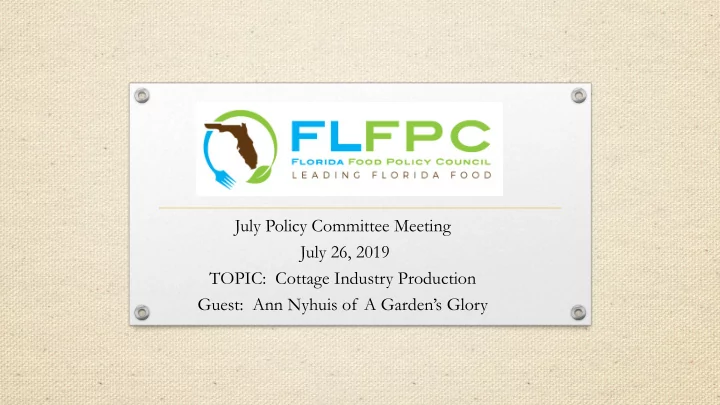

July Policy Committee Meeting July 26, 2019 TOPIC: Cottage Industry Production Guest: Ann Nyhuis of A Garden’s Glory
Do you need a FDAC license or training for your local, artesian product under the Cottage Industry? Let’s have a discussion: Where to get the knowledge on Florida Cottage Food? So what's really up with the phrases like “end user" or "not allowed foods” mean to a start up cottage business? What’s mandatory when labeling your cottage products? How to stay up to date with cottage regulations!
Florida Legislation set guidelines on: 1. Types of cottage food products allowed 2. Limiting where cottage food products can be sold 3. Registration, licenses, permit requirements 4. Limits on sales 5. Requirements on labeling of cottage food products 6. Minimal regulatory requirements and/or licenses on Cottage Foods 7. & much more
SAFETY GUIDELINES FOR COTTAGE FOOD OPERARITONS Know the difference: Permitting Food: All food preparation, processing, repackaging and storage must be performed in a permitted establishment Exempt from Permitting/Cottage Food Operation : Non potentially hazardous foods prepared in a consumers primary residence and sold directly to the consumer from the home, flea market, green market or roadside stand
Approved sale locations Sell direct to the end consumer from: Prohibited method of sales Primary residence Farmer’s Market Sell direct to the end consumer Flea Market from: Green Markets Wholesale Restaurants/Grocery stores Mail order Consignment NOTEWORTHY: Specific rules on Internet Sales Exits
Cottage Law allows small time producers • Single family residence with at least one stove/oven • To use appliances at home to process & manufacture low risk foods for direct sales to consumers WHAT’S NOT APPROVED UNDER COTTAGE OPERATIONS: • Permitted facilities • Garages • Sheds • Barns • Outbuildings • Summer house
Sell and deliver directly to consumers only: Cottage food products must be sold and delivered directly to the consumer or to the consumer's private event venue such as a wedding or birthday party. No wholesale sales: Sales of cottage food products are prohibited for wholesale. Only within Florida: Cottage food operators can sell cottage foods only within the state of Florida and not across state lines. Mail order: No Cottage food operators may advertise for sale, offer for sale and accept payment for cottage food products on their website but the products are prohibited to be delivered by mail order. Internet sales: Yes. The law allows orders and payments over the internet, however, the cottage food products must be delivered directly to the consumer or to the consumer's private event venue such as a wedding or birthday party. NOTE: A permitted food establishment cannot sell cottage foods since they are from an unapproved source. For example, you may not sell cottage foods to or at a restaurant.
Cottage Food operations may only sell cottage food products which are prepackaged with a label affixed that contains specific information (printed in English)
Most Cottage Food operations forget this very specific & required labeling statement: MADE IN COTTAGE FOOD OPERATION THAT IS NOT SUBJECT TO FLORIDA’S FOOD SAFETY REGULATIONS This statement should be printed in at least 10 point font type (clear contrast from background to enable easy reading)
KNOW WHEN A CHANGE IN BUSINESS DIRECTION IS NEEDED
Example: an addition of a non-allowable food ingredient to a recipe
The Cottage Foods that I wanted to handcraft and was allowed to produce under Cottage Food Legislation: Jams, jellies and preserves The Cottage Foods I was not allowed to produce: Salsa, barbecue sauces, ketchups and/or mustards Canned fruits and vegetables, chutneys, vegetable butters and jellies, flavored oils, hummus, garlic dip and salsas Canned picked products such as corn relish, pickles, sauerkraut
When you are ready to start, you should call 1-800-HELP-FLA Ask the experts – Melissa Durkin, Consumer Services Specialist Florida Department of Agriculture and Consumer Services Division of Food Safety Bureau of Food Inspection (850) 245-5523 FoodInsp@freshfromflorida.com Their mission is to “Ensure the safe and wholesome food supply and support Florida’s Food Industries”
THANK YOU FOR JOINING THE MEETING Visit - A Garden’s Glory ¶ www.agardensglory.com ¶ Facebook ¶ Instagram
Recommend
More recommend